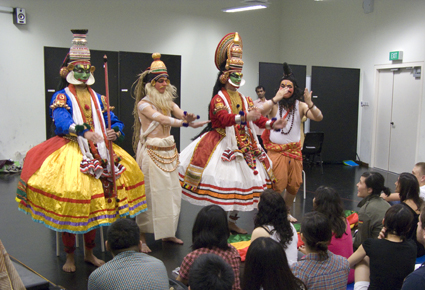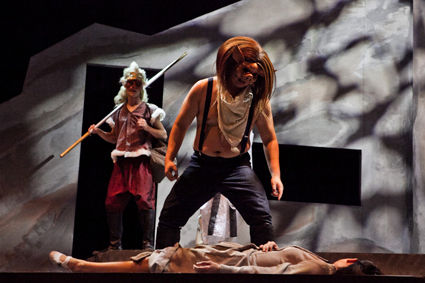theatre/performance education: training off-shore
keith gallasch: lasalle college of the arts, singapore

LASALLE acting students learn Kathakali performance skills
photo Crispian Chan
LASALLE acting students learn Kathakali performance skills
PROFESSOR PETER BOOTH, SENIOR DEPUTY VICE-CHANCELLOR AT THE UNIVERSITY OF TECHNOLOGY SYDNEY WAS RECENTLY REPORTED ON THE FRONT PAGE OF THE SYDNEY MORNING HERALD AS SAYING OF AUSTRALIAN ‘STAY-AT-HOME’ STUDENTS: “WE AS A UNIVERSITY THINK IT’S QUITE SAD AND WE’VE MADE A LOT OF EFFORT. IT WOULD BE BETTER FOR AUSTRALIA TO HAVE MORE POSITIVE PROGRAMS TO ENCOURAGE STUDENTS TO DO SOME OF THEIR STUDY OVERSEAS” (SMH, SEPT 14).
If you have ambitions in the performing arts and a strong interest in intercultural performance Singapore’s LASALLE College of the Arts might be the place for you with its embrace of Asian and Western traditions, excellent facilities and teacher-student ratios, as well as a related media arts faculty and film school.
For many years Australian universities have relied financially on a steady flow of overseas students, mostly from Asia. Although, after USA and Britain, Australia has the third largest take-up of foreign students globally, some 22% of the Australian university population, numbers have dropped by 9.4% in 2010-11. This is for a variety of reasons: fears of racist violence, the high Australian dollar, foreign student management scams outside of the university sector and, given new visa restrictions, decreasing opportunities for students to stay on in Australia after graduating (the Australian Government has recently relaxed somewhat the visa and post-study work restrictions to help universities sustain numbers and income). Another reason is the growing attractiveness of universities and other tertiary education institutions within Asia itself, particularly as the region plays a growing role in the world’s economy and develops its tertiary education sector.
Focusing on fine art, design, media and performing arts in a culturally rich island state LASALLE is located in Singapore’s cultural centre. Equipped with one theatre and two black box spaces, its Faculty of Performing Arts was spearheaded by Aubrey Mellor, a leading Australian theatre director, formerly Director of NIDA. Mellor was the Dean of the Performing Arts 2008-2011 and is now a Senior Fellow at LASALLE. The faculty has long had connections with Australia through a number of teachers working there over many years, for example composer Lindsay Vickery (now returned to Perth), virtuoso saxophonist Timothy O’Dwyer, NIDA alumnae Edith Podesta and a former concert soloist with the West Australian Symphony Orchestra, Bronwyn Gibson.
What LASALLE offers students is a rich cross-cultural, practice-based curriculum in the performing arts with a very attractive and highly competitive (not least for Australian universities) ratio of one teacher per seven students.
Venka Purushothaman, LASALLE’s Vice-President (Academic) and Provost, and Acting Dean of the Faculty of Performing Arts, says, “Singapore is at the ebb and flow between the west and east. LASALLE is therefore able to capitalise on the rich and diverse groups of visiting artists from North America, Europe and the Asia-Pacific. Through its link to UK film producer David Puttnam supporting the development of young filmmakers in Asia, The Puttnam School of Film, part of LASALLE’s Faculty of Media Arts, has also been instrumental in growing the creative talent base for the film and video industry.”
Wolfgang Muench, Dean of the Faculty of Media Arts, writes, “The philosophy within LASALLE is to encourage students to collaborate on interdisciplinary projects in order to learn new skills and sensibilities that will stand them in good stead when they enter the real world. Many of the Media Arts students have collaborated with dance and acting students on performances that showcase the diversity of the range of talents that are developed here.”
Aubrey Mellor likewise emphasises a diversity of experience and interaction: “In the Diploma in Dance, contextual studies support the understanding of distinct stylistic features, but dance practice and dance skills take precedence. The aim is a versatile and flexible dancer, equally at ease with any choreographic demand from popular, ethnic and period dance. Essentials of classical ballet, contemporary dance and physical theatre are used but are not specialisations.” As for music training the focus is on “knowledge of style, rhythm and cultural sources and the inclusion of cross-disciplinary subjects such as Performance Art, Film and Video Collaboration and Southeast Asian Cinema that accord students with the scope to exercise versatility and to think and practise across artforms and cultures.”
Timothy O’Dwyer, who heads the School of Contemporary Music within LASALLE’s Faculty of Performing Arts, elaborates: “In the popular music oriented Diploma in Music, students rehearse in small groups and perform every week. They learn how to improvise, have lessons on their instruments, learn music theory, compose their own songs and learn about the history of music from some of the most experienced performers and educators in the region. The BA(Hons) Music covers classical, jazz and popular music as well as composition and music technology. Taught within a western musical discourse, the programs introduce a diverse blend of ideas found in Asia, Europe, Africa and the Americas—and schools students in a range of contemporary musical practices, in both practical and theoretical contexts.”

LASALLE students perform Journey To Nowhere
photo Crispian Chan
LASALLE students perform Journey To Nowhere
For students undertaking the Diploma in Performance, the first year course in acting, improvisation, voice, movement and script analysis is framed within the history of the performing arts and visual culture. The second year focuses on musical theatre, with the experiential work underpinned by lectures and seminars in Southeast Asian performance traditions as well as dramatic writing and dramaturgy. The third year involves acting work in LASALLE’s Screen Acting Unit and studies in Southeast Asian Cinema.
For the BA(Hons) Acting, through classes, projects, workshops and productions, the course develops students’ abilities to work in an ensemble environment and with awareness of their own imaginative resources. The program collaborates with other faculties, specifically The Puttnam School of Film in the Media Arts faculty and offers rich training within a wide cultural and historical context. For students from non-Asian cultures an attractive feature in Level 1 is the Asian Theatre Project plus intensive stylistic workshops, from Commedia to Kabuki. In the final year, Level 3 operates as a theatre company, with ensemble members experiencing a range of roles, styles, genres and disciplines.
Recent First Class BA(Hons) Acting graduate Walter Hanna, who hails from Perth, feels privileged to have been given the opportunity to experience different forms of Asian theatre practices during his studies at LASALLE. Hanna says, “From the very beginning, we were trained by very experienced practitioners who are skilled in Kathakali, Chinese opera, and Indian martial arts. The Asian Theatre Project in our first year of acting school gave us a wide spectrum of learning opportunities and allowed us to be schooled in traditional Asian artforms. This is something that I would not have had the chance to experience if I had studied in Australia.” Hanna participated in a LASALLE production, Journey To Nowhere, in 2010—a tongue-in-cheek take on the famous Chinese epic Journey To The West. “Before doing this show, I had absolutely no idea about Chinese myths and cultural beliefs,” says Hanna.
The distinctive BA(Hons) Theatre+Performance degree with its orientation on leadership is intended for theatre devotees who do not wish to work onstage or backstage. Aubrey Mellor writes, “Graduates are equipped to initiate theatre-making or writing and find employment collaborating with creative leaders locally, regionally or internationally. It engages with traditional and contemporary theory and current and traditional methods of both the East and West are valued. Emphasis is placed on developing the leadership skills for those students wishing to become directors, playwrights, dramaturgs, critics or drama teachers. Level 3 includes advanced studies in inter-cultural theatre practice, developing a specialisation and a major personal production and thesis.” The BA(Hons) Musical Theatre is the first of its kind in Asia designed to prepare students for professional careers in musicals, plays, cabaret, film and television. Numerous graduates from both Musical Theatre and Acting programs have found employment around the world.
There are also Diplomas in Technical and Production Management and in Audio Production as well as a BA(Hons) Technical Theatre, where stage management is central and students can specialise in scenography, lighting, sound and production management. These programs deliver to the huge number of fully produced plays and musicals as well as dance and music shows. Graduates are in high demand from the rapidly growing performing arts, both nationally and regionally, with another 39 new performing spaces brought on line in Singapore.
There is emphasis throughout on a solid grounding in performance administration and financial management as well as professional theatre internships and periodical performance projects. In all diploma and degree courses, leading directors, conductors and choreographers from the region and beyond are involved in the creation of productions.
Bronwyn Gibson, Program Leader for Musical Theatre, says, “LASALLE offers a unique opportunity for Australian students to receive internationally-recognised tertiary education while developing the self-sufficiency and personal growth that comes with living in a foreign country. Student life is enriched by the constant cross-cultural dialogue and learning opportunities derived from peers of diverse backgrounds. Singapore is an inherently multi-racial country and offers an excellent introduction to the dynamic potential that Asia has to offer on a global scale whilst positioned in close geographical proximity to Australia. LASALLE offers the Australian student the best of both worlds.”
According to a recent OECD report, Education at a Glance, there are “24 international students in Australia for every one national studying overseas. The ratios for both the US and Britain are 1-11” (SMH, Sept 14). Certainly, given the impact of traditional Asian dance and theatre traditions on Australian performing arts, you’d think more young Australians would take up opportunities that combine both their own Western and increasingly familiar and pertinent Asian traditions and innovations in performance.
LASALLE College of the Arts, Faculties of Performing Arts & Media Arts, www.lasalle.edu.sg
RealTime issue #105 Oct-Nov 2011 pg. 31






